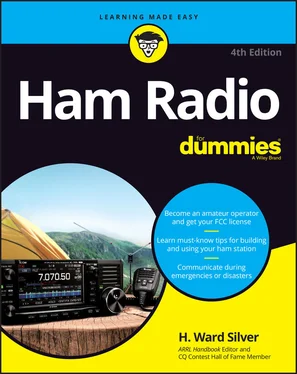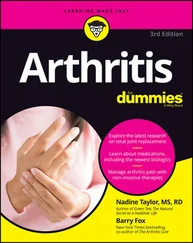General class licensees can’t use every frequency; the lowest segments of several HF bands are for Amateur Extra class licensees only. These segments are considered to be prime operating territory. If you become interested in contesting, contacting rare foreign stations ( DXing; see Chapter 11), or just having access to these choice frequencies, you want to get your Amateur Extra license — the top level.
The Amateur Extra exam consists of 50 multiple-choice questions, 37 of which you must answer correctly to pass. The exam covers additional rules and regulations associated with sophisticated operating and several advanced technical topics. Hams who pass the Amateur Extra exam consider their license to be a real achievement. Do you think you can climb to the top rung of the licensing ladder?
The amateur service licensing rules have changed over the years, reducing the number of license classes. Hams who hold licenses in deleted classes may renew those licenses indefinitely, but no new licenses for those classes are being issued.
Two grandfathered license classes remain:
Novice: The Novice license was introduced in 1951 with a simple 20-question exam and 5-words-per-minute (WPM) code test. A ham with a General class (or higher) license administered the exam. Originally, the license was good for a single year, at which point the Novice upgraded or had to get off the air. These days, the Novice license, like other licenses, has a ten-year term and is renewable. Novices are restricted to segments of the 3.5, 7, 21, 28, 222, and 1296 MHz amateur bands.
Advanced: Advanced class licensees passed a written exam midway in difficulty between those for the General and Amateur Extra classes. They have access to frequencies beyond the General licensees.
Table 4-2shows the relative populations of all types of U.S. license holders as of February 2021.
TABLE 4-2Relative Populations of U.S. License Classes
| License Class |
Active Licenses |
Share of Active Licensees |
| Tech |
395,683 |
51.0% |
| General |
183,283 |
23.7% |
| Amateur Extra |
152,643 |
19.7% |
| Advanced |
37,115 |
4.7% |
| Novice |
7,254 |
0.9% |
| Total |
775,978 |
100% |
Source: www.arrl.org/fcc-license-counts
To pass the exam, you’ll need to do a little studying and there are plenty of opportunities to practice. Then you’ll take your exam, administered by volunteer hams who were also in your shoes once upon a time. After you pass, you’ll receive a call sign that is yours and yours alone: your radio name. Ready? Let’s go!
Studying the exam questions
ARRL ( www.arrl.org ) and other organizations publish study guides and manuals, some of which may be available through your local library. Also, online training and study guides are available. All of these use the actual questions that are on the test. Take advantage of these materials, and you’ll be ready to pass the exam on test day.
 The exam questions, the question pool, changes every four years. Make sure that you have the current version of study materials, containing the correct questions and any recent changes in rules and regulations. Each license manual should clearly show its “expiration date” on the cover.
The exam questions, the question pool, changes every four years. Make sure that you have the current version of study materials, containing the correct questions and any recent changes in rules and regulations. Each license manual should clearly show its “expiration date” on the cover.
 I go over some useful ways to study for the questions in Chapter 5.
I go over some useful ways to study for the questions in Chapter 5.
In the Olden Days, hams took their licensing tests at the nearest FCC office, which could be hundreds of miles away. I vividly remember making long drives to a government office building to take my exams along with dozens of other hams.
Today, although the FCC still grants the licenses, it no longer administers amateur radio licensing examinations. In the United States, these exams are given by volunteer examiners (VEs); some VEs even file the results with the FCC. This process enables you to get your license and call sign much faster than in the days when the FCC handled everything on paper.
In-person exam sessions are usually available a short drive away at a club, a school, or even a private home. Beginning in 2020, “fully remote” exam sessions can be conducted online and monitored by teams of VEs. Digital signatures and other state-of-the-art tools are used to insure the quality of the exam process.
 See Chapter 6for full details on finding an exam session near you or online and taking your test.
See Chapter 6for full details on finding an exam session near you or online and taking your test.
Volunteer examiner coordinators
A volunteer examiner coordinator (VEC) organization takes responsibility for certifying and coordinating the volunteer examiners (VEs) who run the exam sessions. The VEC also processes FCC-required paperwork generated during the session. Each VEC maintains a list of VEs, upcoming exam sessions, and other resources for ham test-takers. It can also help you renew your license and change your address or name. There may be a small fee charged by the VEC to cover expenses of the volunteers and maintaining the exam program. As of mid-2020, the maximum fee was $15 to take an exam for any of the license tests.
The VEC with the most VEs is the group run by the American Radio Relay League (ARRL-VEC), but 13 other VECs are located around the United States. Some VECs, such as ARRL-VEC and W5YI-VEC, operate nationwide; others work in only a single region.
 You can find VEC groups that conduct exams in your area at
You can find VEC groups that conduct exams in your area at www.ncvec.org .
VEs make the system run. Each exam requires three VEs to administer or proctor the session, certify that the test was conducted properly, and file the necessary information to process the exam results. VEs are responsible for all aspects of the testing process, including providing the meeting space and announcing the exam sessions. (For remote communities, exam sessions can be administered online by a VE team with local volunteers. This is discussed in Chapter 6.) If they incur any expenses, such as for supplies or facility rental, they’re allowed to keep up to $7 per person of the test fee; any left-over fees go to the VEC to cover its expenses.
VEs are authorized to administer license exams for the same class of license they hold themselves or for lower classes. A General class VE, for example, can administer Technician and General exams but not Amateur Extra exams. Extra class licensees can give exams for Amateur Extra, as well.
 General, Advanced, and Amateur Extra class licensees can become VEs by contacting one of the VEC organizations and completing whatever qualification process that VEC requires. The ARRL-VEC, for example, provides a booklet on the volunteer licensing system and requires applicants to pass a short exam. VE certification is permanent as long as it is renewed on time with the VEC.
General, Advanced, and Amateur Extra class licensees can become VEs by contacting one of the VEC organizations and completing whatever qualification process that VEC requires. The ARRL-VEC, for example, provides a booklet on the volunteer licensing system and requires applicants to pass a short exam. VE certification is permanent as long as it is renewed on time with the VEC.
Читать дальше

 The exam questions, the question pool, changes every four years. Make sure that you have the current version of study materials, containing the correct questions and any recent changes in rules and regulations. Each license manual should clearly show its “expiration date” on the cover.
The exam questions, the question pool, changes every four years. Make sure that you have the current version of study materials, containing the correct questions and any recent changes in rules and regulations. Each license manual should clearly show its “expiration date” on the cover. I go over some useful ways to study for the questions in Chapter 5.
I go over some useful ways to study for the questions in Chapter 5. General, Advanced, and Amateur Extra class licensees can become VEs by contacting one of the VEC organizations and completing whatever qualification process that VEC requires. The ARRL-VEC, for example, provides a booklet on the volunteer licensing system and requires applicants to pass a short exam. VE certification is permanent as long as it is renewed on time with the VEC.
General, Advanced, and Amateur Extra class licensees can become VEs by contacting one of the VEC organizations and completing whatever qualification process that VEC requires. The ARRL-VEC, for example, provides a booklet on the volunteer licensing system and requires applicants to pass a short exam. VE certification is permanent as long as it is renewed on time with the VEC.










